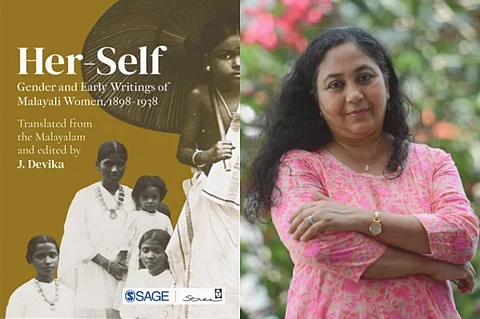
- HOMEGROWN WORLD
- #HGCREATORS
- #HGEXPLORE
- #HGVOICES
- #HGSHOP
- CAREERS
- ABOUT US
- CONTACT US

By dint of the internet, Feminism has become a popular term of the 21st century thrown around generously in conversations, memes and public discourse. But the fight itself started way before the movement had a name and an ideology. Free-thinking women have been voicing their pain against patriarchal structures for centuries; though it took a long time for them to be heard. India saw the rise of the feminist movement around the same time it emerged in the west. During the 19th century, the Indian woman’s quest for civil, political and religious rights arose from the belly of the era’s great social and religious reform movements. Historians refer to the abolition of Sati in 1829 as the first watershed moment in India’s modern feminist movement. Its origin and development can be found in texts and literature from the 19th century.
Her-self (Gender and early writings of Malayali women, 1898-1938) is a striking piece of literature capturing the feminist thought and ideology from that era. Translated for the first time into English, these 29 essays are the musings of Nambutiris, Nairs, Ezhavas, Syrian Christians and two Muslim women who had access to education, revealing the vigorous debate over modern gender relations that was then taking place. It presents the reflections of these women on education, duties, vocation, civil roles and what was ‘womanly’. This book is translated and edited by author J. Devika, a Malayali historian, feminist, social critic and academician from Kerala.
Described by the Indian feminism-activist, V. Geetha as ‘texts that dazzle’, these pieces are an effort to define, in their unique ways, women’s perspectives as specifically oppositional standpoints. Many are replies, rejoinders and responses to ignorant statements made by male public figures of the time who claimed to speak on behalf of women. These insightful essays spread across chapters called ‘Manly duty’, ‘Are women weak?’, ‘Womanliness’ and ‘The place of women in education’, and more, offer a vivid picture of the social contract and its concerns through the eyes of women facing them over a period of 3 decades in the 19th and 20th centuries.
Her-self is an enigmatic read for women, men and non-binary folks exploring the fourth wave of feminism in the context of gender, identity and societal roles. It takes us to the roots of the feminist movement and the transformation of civic life through constructive dialogue. Delving into the past is an ingenious way to form a compass to navigate intersectionality and inclusivity in the evolution of modern feminism. As we participate in the debate for our journey towards equality, the essays by these Malayali women not only map out the path for us but also become a rearview mirror reflecting the origins of individual and collective liberation. Even though the book touches on some serious subjects, the rebutting nature of the essays is also a fun and delightful way to go head-to-head with the voice of misogyny in our minds and the world.
You can get the book here.
If you enjoyed reading this, we also suggest:
The Indian Art Project That’s Bringing Feminism To Children’s Literature
8 Indian Stories That Offer Refreshing Female Perspectives We Need
